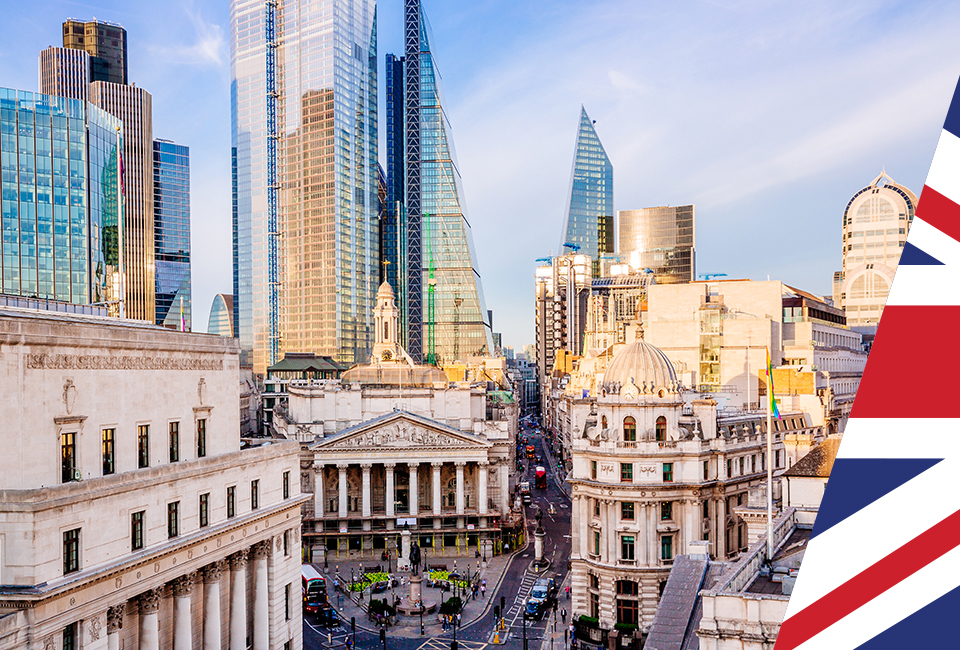Five UK
Share
ideas
HL's experts share their ideas for five UK companies they believe have long-term potential.
Important notes
This page isn’t personal advice. If you’re not sure whether an investment is right for you please seek advice. If you choose to invest the value of your investment will rise and fall, so you could get back less than you put in.
It’s no secret that the UK economy has struggled over the past year or two. Inflation’s been running consistently higher than the Bank of England’s 2% target, leading to an aggressive set of interest rate hikes.
These rate hikes have weighed on investor sentiment, creating value opportunities. The FTSE 100 index is trading at just 13.4 times earnings, which is attractive relative to historical levels and other developed markets.
The UK’s also home to some world-class companies, generating revenues right across the globe. That feeds into their dividend-paying potential, with many businesses boasting impressive records of growing dividends over the long term.
With all this in mind, we’ve selected what we believe are some of the best opportunities for those wanting to invest in UK companies.
Investing in individual shares isn’t right for everyone. That's because it's higher risk, your investment depends on the fate of that company. If that company fails, you risk losing your whole investment. If you cannot afford to lose your investment, investing in a single company might not be right for you. You should make sure you understand the companies you're investing in and their specific risks. Ratios shouldn’t be looked at in isolation.
Make sure any new investment forms part of a diversified portfolio.
This isn’t personal advice or a recommendation to buy, sell, or hold any investment. Shares and any income from them can go down as well as up in value and there’s always a risk you could get back less than you invest. If you’re not sure what to do, please ask for advice. Yields are not guaranteed, nor a reliable indicator of future income.
Information correct as at 2 May 2024 unless otherwise stated.
Keep an eye on our UK share ideas
Would you like to see how these shares get on in the future?
Watchlists let you track investments without spending real money. Set one up to follow the performance of our UK share ideas, create your own watchlist or copy the details of real holdings.
To follow these shares, use the ‘add to watchlist’ button below the name of each share. Then log in to your account to keep track online or with the HL mobile app.
Keep an eye on our UK share ideas
Watchlists let you track investments without spending real money. Set one up to follow the performance of our UK share ideas, create your own watchlist or copy the details of real holdings.
To follow these shares, you’ll need to open an account. There are different types of investment account available, and the right one for you will depend on your goals.
Once you’ve opened an account, you can use the ‘add to watchlist’ button below the name of each share to keep track online or with the HL mobile app.
AstraZeneca
Science-led growth
The UK has an illustrious history in the field of medical research with landmark discoveries such as penicillin and the structure of our genetic code, DNA. More recently, the UK’s largest pharmaceutical company, AstraZeneca, played an important part in the response to the COVID-19 pandemic.
Looking to the future, cancer treatments (currently about a third of sales) are a key area of focus. These drugs can maintain high growth levels for many years, as patient access improves, approvals are gained in new markets, and clinical trials prove their efficacy in additional diseases. And the diverse late-stage pipeline means there are lots of potential shots on goal. Some candidates such as dato-DXd, which in some cancers could replace chemotherapy, have the potential to be transformational.
Astra is also seeing strong growth elsewhere from the likes of rare disease medicine Ultomirisis, as well as Farxiga which treats cardiovascular disease, kidney problems and type 2 diabetes. We see the broad focus on different disease areas as a positive.
The intense focus on product development can be expensive in terms of research and marketing. That's no bad thing, and drug development is a lengthy process, but increased internal investment can drag on profits. It's important to look at the shares on a long term view.
AstraZeneca's research driven peformance ($bn)
Past performance is not a guide to the future.
Source: Refinitiv Eikon 2 May 2024 (2024/25/26 figures are estimates according to Refinitiv analyst consensus)
We’re comfortable with net debt levels which sit at about 1.5x cash profits. Meanwhile, Astra is generating strong cash flows from its existing portfolio of marketed medicines. We think this supports both the ambitious research programme and modest dividend yield, but nothing is guaranteed. Continuing success in drug approvals will be needed to offset the potential loss of revenue from patent expirations over the coming years.
The valuation, which sits a little below the long-term average, doesn’t look too demanding. But a bulging pipeline also carries significant execution risk and investors need to be prepared for disappointments.
BP
Powering cash flows
BP’s roots go back to the early days of oil prospecting, and since it first struck black gold under the sands of what was then Persia, it’s evolved into a fully integrated energy company. It produces, refines and transports oil and gas but also has a significant customer distribution network for motorists and the aviation industry.
Fossil fuels are still an essential part of the energy mix and are likely to remain the bedrock of BP’s business for the foreseeable future. Market forecasts even suggest that demand for traditional sources of energy is unlikely to have peaked just yet. That can be a difficult place to be. The Deepwater Horizon disaster in 2010 came at a huge human, environmental and financial cost.
Meanwhile, the international community made a firm pledge to transition away from fossil fuels at last year’s COP28 summit. That’s why we’re pleased to see that BP also has one eye firmly on renewables and low-carbon energy. It already generates enough renewable energy to power around 2 million homes and a pipeline of projects that could see this capacity increase more than 20 times over. This will require significant investment.
Both BP's traditional oil and gas extraction business and its emerging focus on cleaner forms of energy are highly capital-intensive. Capital expenditure topped $16bn last year and is likely to stay at a similar level until at least 2030. Fortunately, the business has a strong record of cash generation, which has been particularly impressive post-pandemic.
BP's Free Cashflow ($bn)
Past performance is not a guide to the future.
Source: Refinitiv Eikon 2 May 2024
That also helps underpin a 4.9% forward dividend yield and ongoing share buybacks. Assuming an oil price of $60, some way below current levels, BP could be expected to keep growing the dividend.
Meanwhile the valuation is significantly below the long-term average. In our opinion, this reflects investor concern over the long-term outlook for the oil and gas industry. However, it's also lagging its peers. That could present an opportunity, if the new CEO can provide investors with assurance that BP can prosper over the long term, but there can be no guarantees.
Greggs
Revamped menu and stores on a roll
Greggs has become a staple in town centres and retail parks across the country. Recent performance has been impressive, with last year's sales breezing past market expectations. It’s starting to build up a reputation for delivering on results day.
A revamped and improved menu, refreshed stores, and growing delivery options all mean it’s able to hoover up demand. Its more accessible price points mean we think it’s well-placed to serve people who want to treat themselves even while watching discretionary spending.
Greggs's revenue (£bn)
Past performance is not a guide to the future.
Source: Refinitiv Eikon 2 May 2024 (2024/25/26 figures are estimates according to Refinitiv analyst consensus)
The evening food-to-go market is huge and an area Greggs has barely scratched the surface of. Just under half of Greggs shops now serve until 7pm or later. With new hot food being trialled this year, it’s giving customers more reasons to visit throughout the day.
Growth did slow as we moved through the year, but that was largely due to fewer price hikes as inflation eased. Keeping prices down is good news for everyone, even if it gives up some short term, top-line growth. The outlook remains positive, with markets expecting high single-digit revenue growth over the medium term. Perhaps surprisingly for a business geared to growth, there's also a 2.6% prospective yield and the board just signed off on a special dividend too. But no returns are guaranteed.
We continue to be impressed with cash generation and the decent cash hoard on the balance sheet. This should provide the firepower needed to fund the supply chain and store upgrades planned over the next few years. A high bar’s been set, so Greggs needs to keep delivering or risk the wrath of a fickle market.
London Stock Exchange Group
An old stock exchange taking new strides
London Stock Exchange Group (LSEG) may be the owner of one of the world’s oldest and largest stock exchanges, but the business has modernised. Over the last decade, it’s taken strides to move away from traditional exchange activities like issuing equity and debt. The acquisition of Refinitiv means data and analytics are its new bread and butter, as well as a clearing business which is riding the wave of regulatory changes to derivative markets.
There’s a lot to like about LSEG’s businesses, but the expected revenue growth in data and analytics is what really excites us. A clear number two in the market, behind Bloomberg, its new partnership with Microsoft should provide the drive and cross-selling opportunities to expand its market share. A host of new features like generative Artificial Intelligence (AI) are also expected to help LSEG incrementally raise prices, which is good news for profitability.
The Refinitiv deal has also transformed the revenue profile of the business. Growth in subscriptions means over 70% of revenues are now recurring. This stickier source of revenue should help lower earnings volatility and provide some protection to the business from swings in the broader market.
LSEG's free cash flow per share (£)
Past performance is not a guide to the future.
Source: Refinitiv Eikon 2 May 2024 (2024/25/26 figures are estimates according to Refinitiv analyst consensus)
As a capital-light business, LSEG enjoys impressive free cash flows and a strong balance sheet to match. That helps to support a modest forward dividend yield of 1.47% and provides management with the financial ammunition to fund growth. In the short term, the excess capital is being used to buy out the remaining shares from Refinitiv’s old owners, but looking ahead, acquisitions could be back on the cards. Adding complementary businesses to the group could supplement and support the longevity of top-line growth.
Taking into account growth prospects, we think LSEG’s valuation looks attractive relative to peers, but achieving that growth won’t be easy. Execution risk and uncertainty over the performance of the global economy could dampen momentum.
NatWest
Showing signs of promise in an unloved sector
NatWest is showing signs of promise, with first quarter results delivering an improved net interest margin from the start of the year and growth in both customer loans and deposits. Performance isn’t as good as this time last year, but markets have been expecting that for some time.
Looking ahead, loan default levels remain low and with the return of real wage growth, plus an improving housing market, we think borrowers can remain resilient. At the same time, banks are seeing easing conditions in the mortgage market and look to be closing in on a peak in terms of consumers shifting to higher-cost savings accounts.
NatWest's deposit evolution
Source: NatWest Q1 2024 results investor presentation (Accessed 2 May 2024)
With headwinds easing, the benefit from NatWest’s structural hedge strategy can do its work - think of this like a bond portfolio that's set to roll on to better rates over the coming years. NatWest is coming off some of the lowest rates in the sector and should be one of the biggest beneficiaries.
We also think management’s revenue guidance of £13-13.5bn for 2024 is conservative. This factors in five interest rate cuts before year-end, when markets are only expecting one or two. Rate cuts are usually bad for banks so that leaves room for guidance to be raised as we move through the year – though nothing is guaranteed.
We think the UK banking sector is unloved, but with strong balance sheets and some easing headwinds on the horizon there’s potential. We see NatWest being well placed to benefit, with an attractive valuation and a prospective dividend yield of 5.54%. There’s also the potential for buybacks, where a company buys its own stock, which can increase the value of the remaining shares. The economic outlook has improved but is still uncertain, and there are still risks from a new management team. As ever, no returns are guaranteed.
A member of the Equity Research team holds shares in NatWest.
The UK in your investment portfolio
You can make the most of the investment opportunity the UK offers, but it’s vital to invest across different countries, as well as industries and companies, to achieve a diversified portfolio.
How to invest in shares
One way to invest for the long term is by using your ISA allowance.
Shares held in a Stocks and Shares ISA aren’t subject to UK income tax or capital gains tax. By saving tax, your money can work harder for you. You can pay up to £20,000 into an ISA this tax year. There’s a 0.45% charge for holding shares in the HL Stocks and Shares ISA, capped at £45 per annum. View our charges. Tax rules for Stocks and Shares ISAs can change and their benefits depend on your circumstances.
Discover the HL Stocks and Shares ISA
For more ways to invest, compare our accounts.
Whichever account you choose, share dealing costs a maximum of £11.95 per deal. You’ll also pay a foreign exchange (fx) charge for overseas shares. View share dealing charges.
This is not personal advice or a recommendation to buy, sell or hold any investment. If investors are not sure of the suitability of an investment for their circumstances, they should seek advice. No view is given on the present or future value or price of any investment, and investors should form their own view on any proposed investment.
Unless otherwise stated estimates, including prospective yields, are a consensus of analyst forecasts provided by Refinitiv. These estimates are not a reliable indicator of future performance. Yields are variable and not guaranteed. Past performance is not a guide to the future and investments rise and fall in value so investors could make a loss.
This has not been prepared in accordance with legal requirements designed to promote the independence of investment research and is considered a marketing communication. Non-independent research is not subject to FCA rules prohibiting dealing ahead of research, however HL has put controls in place (including dealing restrictions, physical and information barriers) to manage potential conflicts of interest presented by such dealing. Please see our full non-independent research disclosure for more information.
Important notes
This page isn’t personal advice. If you’re not sure whether an investment is right for you please seek advice. If you choose to invest the value of your investment will rise and fall, so you could get back less than you put in.


